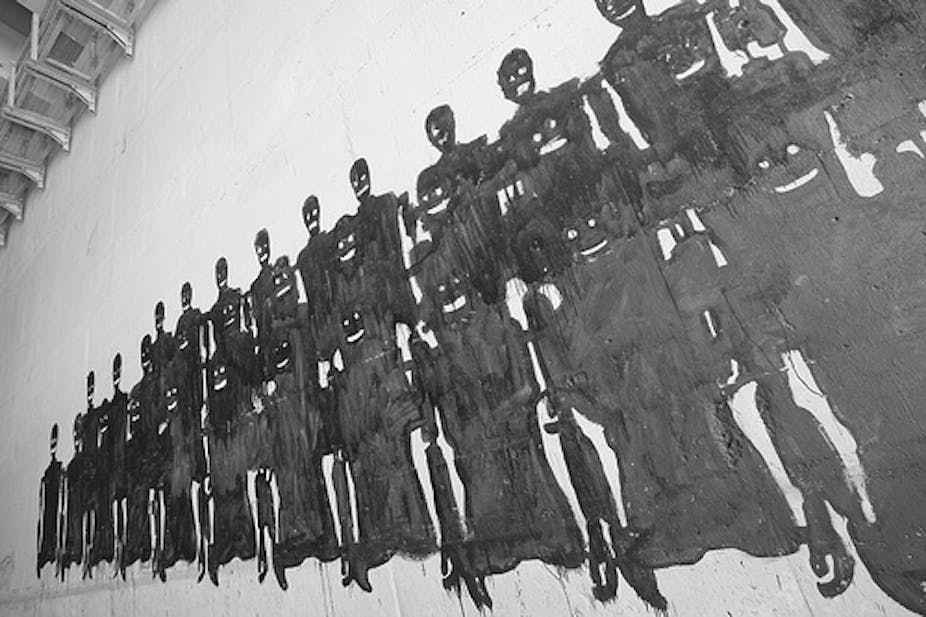Despite its association with totalitarian societies of the left and right, indoctrination is also a common feature of societies that describe themselves as free: those where the coercive powers of the state are weakest and the population cannot be easily controlled by violence and fear.
Although since the 1930s it has been primarily understood in pejorative terms, not all indoctrination should be seen as malignant.
It underwrites every faith-based belief system including all monotheistic religions. It is the primary means for the transmission of values from one generation to the next. And it would be difficult to imagine any educational curriculum – or parental advice to young children - without propaganda of some kind featuring extensively.
Indoctrination is particularly prevalent in minority and persecuted cultures, especially amongst 1st generation migrants, because it is seen as an essential tool for maintaining social cohesion, integrity, and ultimately, group identity.
In establishing traditions which must be followed, or taboos which need to be avoided, indoctrination first erects and then patrols the intellectual boundaries within which legitimate thoughts can be freely expressed. These boundaries are tightly prescribed but they must remain largely invisible if they are to be effective and remain unchallenged.
As Milan Rai argues, “we can no longer perceive the ideas that are shaping our thoughts, as the fish cannot perceive the sea.” Debate and discussion occurs, but within strictly controlled limits that may not be widely recognised.
In this way, a degree of ideological control is achieved in free societies, not by threats or intimidation, but by defining the spectrum of permitted thought: a voluntary rather than a coercive constraint, but no less effective.

Control is achieved by removing contestable ideas from the contest of ideas, making them instead presuppositions whose acceptance is actually a pre-requisite for discourse about a particular subject.
Making an idea implicit tends to protect it from being challenged or opposed. By being constantly reinforced, the idea comes to be accepted as part of the framework necessary to even start a discussion.
Paradoxically, this is easier in open societies which champion free speech and permit vigorous debates and discussion: said to be the lifeblood of all liberal democracies.
In truth, much of what is defined as dissent in these societies is in fact feigned and confined to the mainstream, which by definition is the only location where “serious” ideas can be found. On some issues, the spectrum of legitimate thought is very narrow.
One recent example is the aftermath of the global financial crisis (GFC) which began in 2007. Policy responses to the crisis in the US centred on how to stabilise or “reform” the global financial system, but within strictly controlled limits which largely preserved the status quo: exorbitant fees regardless of company share price or the performance of bankers, generous bonuses unrelated to share price or performance, innovative complexity of financial instruments and, most importantly, minimal regulation of the sector.
The challenge was to make the existing system work better, rather than replace it with something less volatile and dangerous, or more just and humane.
As a consequence of a concerted mobilisation by the business class and President Obama’s indebtedness to the finance community for funding his election campaigns, even minor proposals for long overdue reform were aborted. Despite a window of opportunity for wholesale reform at the height of the crisis, serious attempts at structural change were not even considered.

An elite consensus for preserving the privileges of the status quo prevailed over the interests of the general population. Consequently, the crisis will almost certainly be reprised, though for much of Europe it has been barely attenuated.
This outcome could not have occurred without the lowering of public expectations and propaganda which sought to limit any changes to the margins of the current system. It was presupposed that the existing system was the best that could be hoped for, and permitted policy discussion was confined to proposals which would not inhibit its workings in any meaningful way.
Extraordinary disparities of wealth and income, or the contrasting fortunes of bankers and pension holders, were seen as simply part and parcel of life. This is because it is vital that the system is seen as broadly legitimate, even by those who have the least to gain from it.
From the perspective of the bankers who launched an offensive against regulation, the campaign was a total success. We are no better prepared for the inevitable, next financial crisis today than we were five years ago.
Indoctrination and propaganda train us for obedience and conformity. They discourage us from thinking differently or creatively, particularly in dealing with new problems and challenges we face every day.
Instead they provide ready-made, pre-prepared answers so we don’t really have to think at all. Too often they attempt to constrain our possible futures by limiting our possible thoughts.

